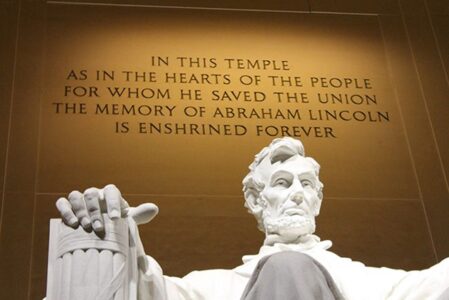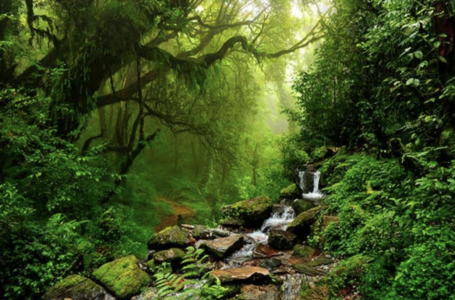“A healthy democracy is as dependent on public life as a healthy ecosystem is dependent on clean air and water: in the absence of an engaged public, democracy begins to die, and some form of oligarchy (government by the few) emerges to take its place.” ~ Parker Palmer, Healing the Heart of Democracy
I’ve been thinking a lot about the question posed in the title of this thought piece, and it strikes me that the equation Ecology + Democracy = Sustainability might be on to something.
I’ve been watching the series Turning Point: The Bomb and the Cold War on Netflix. It is excellent. Episode Six is the most powerful episode for me. It is set in and around 1989 when many people behind the Iron Curtain desperately yearned to be freed from the oppressive yoke of communism and embrace the power and freedom of democracy.
The episode tells the story of democratic movements in East Germany, Poland, and Czechoslovakia and leaders like Lech Walesa in Poland and Vaclav Havel in Czechoslovakia.

Photo Credit: Reuters. The Solidarity Movement in Poland
It is moving to watch so many courageous and passionate citizens in these countries standing up against brutal, violent, repressive authoritarianism, and for a government “of the people, by the people, and for the people,” as Abraham Lincoln called for in the Gettysburg Address. These movements and Lincoln’s words inspire me every time I think about them and deepen my appreciation for democracy.

Photo Credit: National Park Service
Today, many Americans in the United States have deep concerns about the health of our democracy. According to the University of Virginia Center for Politics, “Top concerns for people are economic inequality and political corruption, as well as the role and influence of global corporations and Big Tech…. Majorities in both parties think there is too much partisan fighting, campaigns cost too much, and lobbyists and special interests have too much say in politics.”
Sounds accurate to me. But we can fix these issues. As citizens in a democracy, we possess the ability and power to change things. What is most troubling is some surveys indicate that 20% of Americans are willing to give up on democracy.
It is not that democracy doesn’t work or can’t work; rather, as Parker Palmer observed, in the absence of an engaged and informed public, a government “of the people, by the people, and for the people” withers. Without engaged citizens at the center of our governmental and civic processes, small numbers of wealthy and powerful interests step into the void and run things to their advantage. That is where we are and why so many people are angry and disenchanted.
This makes me think about how Benjamin Franklin responded to a question about the kind of government the founders had created: “A republic, if you can keep it.” (emphasis added)
I have always disagreed with Winston Churchill’s comment quoting an author he did not cite. He said, “Indeed it has been said that democracy is the worst form of Government except for all those other forms that have been tried from time to time….”
In her book Daring Democracy: Igniting Power, Meaning, and Connection for the America We Want, longtime defender and advocate for living democracy Frances Moore Lappé responded to Churchill’s comment by writing, “…democracy is essential both to protect us from the worst in our nature and to realize the best…. Democracy is not just essential. It is noble, and in fact, worthy of our devotion.”
In Blessed Unrest, Paul Hawken wrote about an unseen movement of millions of organizations working to achieve a just, safe, sustainable world: “If the movement in all its diversity has a common dream, it is process – in a word, democracy…a reimagination of public governance emerging from place, culture, and people.
What does all this have to do with ecology?
The first rule of sustainability is to live in accord with the laws of nature. Over the course of 3.8 billion years, nature has demonstrated prolific and stunning success at creating diverse, complex, abundant, productive, interdependent, and beautiful life forms and living systems pretty much everywhere on Earth. And nature does most of its irreplaceable magic at room temperature, under normal pressures, and using water. Amazing.

Photo Credit: The Carbon Institute
In the words of Janine Benyus, “life creates the conditions that are conducive to life,” dynamic, emergent, flourishing life. Ecosystems offer a proven model for thriving human systems. Democracy is a compelling form of government because many of its principles, processes, and values mimic those of ecology, of living systems.
Perhaps the most important alignment is that in both nature and democracy, there is a balance between competition and cooperation, between individual freedom and the common good. Healthy ecosystems and healthy democracies promote individual freedom within the context of what is best for the entire community. Healthy ecosystems and democracy optimize what is best for the whole. All parts flourish, and no one segment overpowers the rest. No one part of the system maximizes its position at the expense of the whole.
In an ecosystem, when one species maximizes its advantages and propagates beyond the system’s carrying capacity, that population either collapses or dominates and forever diminishes the rest of the ecosystem. There are so many examples of this. Think about Chinese privet, Ligustrum sinense Lour, an invasive blight that wrecks natural communities in the Southeast.
In a democracy, when powerful interests and subsets of the population work to crush the competition and dominate according to their self-interest and subset of values, the system wobbles and weakens. One example of our weakened democracy is the dangerous wealth gap between the very wealthy and everyone else, which has continued to grow over the past several decades in the U.S. As Supreme Court Justice Louis Brandeis observed, “We can have democracy in this country, or we may have great wealth concentrated in the hands of a few, but we can’t have both.”
Brandeis was not the first to make this observation. Greek historian Plutarch (born around 46 C.E.) wrote, “An imbalance between rich and poor is the oldest and most fatal ailment of all republics.”
Think of the human body. We all want the whole system to work together well and be balanced. No one would want to sacrifice their hearing to see like an eagle or maximize their musculature by undercutting their respiratory system. No one wants to see one part of their body grow indefinitely out of proportion at the expense of the rest of the system. That’s called cancer.
This point, that healthy democratic and natural systems optimize the wellbeing of the whole, is a critically important point, very often ignored, neglected, or misunderstood. Too many people seem to think that democracy is all and only about individual rights.
Viktor Frankl, survivor of nightmarish brutality in Nazi concentration camps, wrote in his extraordinary little book Man’s Search for Meaning that “Freedom is only part of the story and half the truth… In fact, freedom is in danger of degenerating into mere arbitrariness unless it is lived in terms of responsibleness. That is why I recommend that the Statue of Liberty on the East Coast be supplemented by a Statue of Responsibility on the West Coast.”
Individual rights and freedom existing within the context of the common good were understood and articulated as a foundational principle from the very beginning of the United States. After the Constitutional Convention finished its work in 1787, about 100 copies of the Constitution were sent to the states to inform their ratification decisions. One of eight known copies was recently discovered in North Carolina in excellent condition. Here’s the Associated Press article about it.
Along with this copy of the Constitution was a letter from George Washington urging ratification. From the AP article: “(Washington) acknowledged there will have to be compromise and that rights the states enjoyed will have to be given up for the nation’s long-term health. ‘To secure all rights of independent sovereignty to each and yet provide for the interest and safety for all — individuals entering into society must give up a share of liberty to preserve the rest,’ wrote the man who would become the first U.S. president.”
There are other ways democracy and ecology are aligned, but this commentary is already too long to go into all that.
A primary goal of sustainability is to create well-being for all of humanity within the means of our life-giving planet. Democracy is designed to nurture the well-being of all people. Ecology generates the conditions, the environment, to make that possible.
Paul Hawken writes: “Sustainability is about stabilizing the currently disruptive relationship between earth’s two most complex systems – human culture and the living world. The interrelation between these two systems marks every person’s existence and is responsible for the rise and fall of every civilization.”
Furthermore, he writes that the sustainability movement and every organization working for a safer, more just world holds at its core two unstated principles: 1. The sacredness of all life and 2. The Golden Rule. The first principle is about the interconnectedness and value of all life, and the second is about our relationship with each other.



